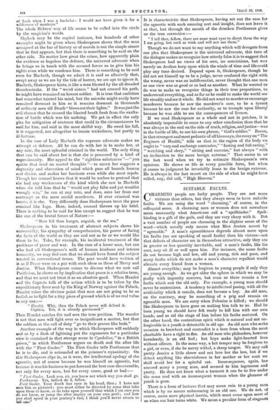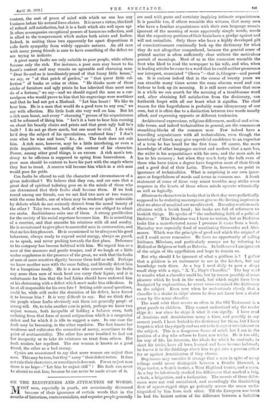SUITABLE FAULTS.
CHARMING people are lucky people. They are not more virtuous than others, but they always seem to have suitable faults. We are using the word "charming," of course, in the colloquial sense. A charming man or woman does not nowadays mean necessarily what Americans call a "spellbinder." Spell- binding is a gift of the gods, and they are very thary with it. But a vast number of people are charming in the slighter sense of the word—which usually only means what Miss Austen meant by "agreeable." A man's agreeableness depends almost more upon his faults (we are speaking of small faults) than his virtues—not that defects of character are in themselves attractive, only they are in greater or less quantity inevitable, and a man's faults, like his coat, may sit ill or well upon him. For instance, the same faults do not become high and low, old and young, rich and poor, and many faults which do not snake a man's character repellent would alienate every friend from a woman.
Almost everythin; may be forgiven to young people if only they are young enough. As we get older the sphere in which we may be faulty with impunity narrows, but even so there remain a few faults which suit the old only. For example, a young man should never be sententious. A tendency to intellectual posing, with all the artificiality which it entails, does not become a boy. An old man, on the contrary, may be something of a prig and remain an agreeable man. We are sorry when Polonius is killed ; we should like Shakespeare to have gone on making him talk to us. Had he been young we should have felt ready to kill him with our own hands, and so rid the stage of him before his faults matured. On the other hand, the contentious spirit which is natural and not un- forgivable in a youth is detestable in old age. An old man who seeks occasion to browbeat and contradict is a bore from whom the most charitable have a right to flee. An old man who philanders, however harmlessly, is an old fool ; but boys make light-hearted love without offence. In the same way, a hot temper may be forgiven to a girl, or even, if she be merry withal, a sharp tongue. We may call pretty Jessica a little shrew and not love her the less, but if we detect anything like shrewishness in her mother or her aunt we shall avoid her for a spiteful cat. Inconsequence, again, has amused many a young man, and seemed to him ingenuous and pretty. He does not know what a torment it can be to live under the same roof with an inconsequent woman when the glamour of youth is gone.
There is a form of laziness that may mean ruin to a young man which is by no means unbecoming in an old one. We do not of course, mean mere physical inertia, which must come upon most of us when our hair turns white. We mean a peculiar form of stagnant
content, the sort of peace of mind with which no one has any business before his natural force abates. It is never a virtue, this kind of refined self-satisfaction, but it is a fault which sits well upon age It often accompanies exceptional powers of humorous reflection, and is allied to the temperament which makes both saints and loafers. Indeed, in uniting these two apparently far apart dispositions it calls forth sympathy from widely opposite natures. An old man with many.young friends is sure to have something of the defect we are trying to indicate.
A great many faults are only suitable to poor people, while others become only the rich. For instance, a poor man may boast to his heart's content and may remain an agreeable and charming man. "Dear So-and-so is inordinately proud of that funny little house," we say, or "of that patch of garden," or "that queer little col- lection" of books or coins or china. "He thinks more of those sticks of furniture and ugly prints he has inherited than most men do of a fortune," we say—and we should regard the man as a cur- mudgeon who would prove to him that his engravings were worthless and that he had not got a Morland. "Let him boast ! We like to hear him. He is a man that would do a good turn to any one," we say with affection. His little fault sits very well on him. But let a rich man boast, and every " charming " person of his acquaintance will be ashamed of liking him. " Isn't it a bore to hear him running on about his beastly chairs and prints and that great ugly hall he's built ? I do not go there much, but one must be civil. I do wish he'd drop the subject of his speculations, confound him ! I don't care what he wins and loses," Sze., &c. The fault does not suit him. A rich man, however, may be a little interfering, or even a little inquisitive, without spoiling the contour of his character. Power, among other good things, is an excuse. A rich man's ten- dency to be officious is supposed to spring from benevolence. A poor man should be content to have his part with the angels where they fear to tread. A reserve will become him which in a rich man would pass for pride.
Can faults be altered to suit the character and circumstances of a given individual ? We believe that they can, and are sure that a great deal of spiritual tailoring goes on in the minds of those who are determined that their faults shall become them. If we look round among our friends, can we not find two men or two women with the same faults, one of whom may be rendered quite unlovable by defects which do not seriously detract from the moral beauty of the other ? Take two men, both of whom we are obliged to admit are snobs. Snobbishness suits one of them. A strong predilection for the society of his social superiors becomes him. He is something of a courtier, and that smooths his relations with all and sundry. He is accustomed to give place to masterful men in conversation, and that makes him pleasant. He is accustomed to be always on his good behaviour, always ready to expend social energy, always on guard, so to speak, and never pushing towards the first place. Deference to his company has become habitual with him. We regard him as a man of fine manners and gentle temper, and if we laugh at a little undue suppleness in the presence of the great, we wish that the faults of men of more sensitive dignity became them half so well. Perhaps we know another man with the same failing, and literally detest him for a bumptious toady. He is a man who cannot carry his faults any more than men of weak head can carry their liquor, and it is unfortunate for him that the bad fairies should have endowed him at his christening with a defect which must make him ridiculous. Is he at all responsible for his own fate ? Setting aside moral questions, could he, while still under the dominion of his defect, have forced it to become him ? It is very difficult to say. But we think that the people whose faults obviously suit them are generally people of strong will. Or, to take another case in point, perhaps we know two unjust women, both incapable of holding a balance even, both suffering from that form of moral astigmatism which is a congenital defect and for which it is idle to suggest a cure. In one case the fault may be becoming, in the other repulsive. The first knows her 'weakness and cultivates the corrective of mercy, sometimes to the point of sentimentality. The other has never troubled to find out her incapacity or to take its existence on trust from others. Her fault renders her repellent. The one woman is known as a good friend, the other as a bad enemy.
Cynics are accustomed to say that more women are unjust than men. This may be true, but they" carry " their defect better. It does not ruin their characters, or sometimes it does not. For an unjust man there is no hope—" Let him be unjust still " ! His fault can never be altered to suit him, because he can never be made aware of it.































 Previous page
Previous page